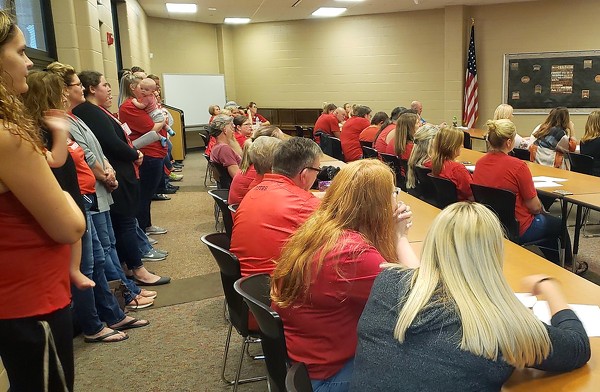Wednesday, October 13th, 2021
Therapist on suicide: Err on side of caution
By Erin Gardner
CELINA - Vicki Topp, a therapist at Topp Counseling LLC, wants people to ask questions and educate themselves in suicide prevention strategies.
"I always say err on the side of caution. But again, suicide is one of those things that's kind of hard to talk about," Topp said at Tuesday's Celina Rotary Club meeting. "If somebody throws that word out there or we know somebody who's been through that, we don't know what to say. So, we just say nothing or move on or chalk it off. I guess the biggest thing I can say is … don't be afraid to talk about it."
As a therapist for 25 years, Topp has seen kids and adults struggle with suicidal thoughts. She says that mental health issues happen right here.
"If you've all grown up in Mercer County, it's a great place to grow up, but things do happen here," Topp said. "Child abuse happens. Traumas happen."
She directed the presentation toward the club members, many of whom are parents and grandparents, and gave preventive strategies to them for kids.
"I think you as community members and the positions you hold, just being in tune to that, of knowing when somebody's struggling and not being afraid to address it," she said. "Rather than what we're taught with our German background of stay out of it, ask (and) be there (for someone)."
More than 15 members attended the meeting. When asked by Joe Cavanaugh about the pandemic's impact on suicide, Topp said suicide rates actually decreased in 2020, but 2021 data isn't available yet. That said, she is counseling many more kids.
Right now, Topp said the counseling agency has a 2- to 3-week waiting period to see clients. Ideally, it would be one week.
As of January, suicide is the 11th leading cause of death in Ohio and the second leading cause of death for those ages 10 to 34, as reported by the American Foundation for Suicide Prevention.
Suicide warning signs include talking about suicide, looking for methods to die by suicide, increased use of alcohol or drugs, sleeping or eating too much or too little, isolating from others, showing extreme mood swings and self-harm, among others, according to a fact sheet Topp provided.
The best way to help someone who is suicidal is to assess the person for risk of suicide or harm, listen non-judgmentally, give reassurance and information, encourage the person to seek professional help and self-help strategies, according to the fact sheet.
"Self-harm is a very big thing that we see a lot with kids and teenagers, whether it be cutting (or) burning," Topp said.
Among the risk factors for suicide are a history of trauma, a previous suicide attempt or a family history of suicide, a recent family or job loss, lack of support and cultural beliefs, according to the fact sheet.
Topp said her agency goes through an intake assessment with clients which involves asking them about previous suicide attempts or abuse. She also explained that sometimes a person attempts suicide, but no one knows because there are no clues.
She shifted the conversation from the viewpoint of a victim to that of a loved one.
"It's one of the worst experiences you can go through … because you feel very isolated and not very many people want to talk about it because they're afraid they're gonna upset you," Topp said of a person who experiences a loss of someone due to suicide. "There's a huge amount of guilt associated with suicide because often we're left with the questions of why."
She elaborated that it's important to check in with those people, too, because they're grieving and might be experiencing depression and similar thoughts.
Topp also explained that people here tie their self-worth to their accomplishments. She said some kids who do well in school and sports experience a burden trying to excel at everything.
"You would be surprised at the kids who come into the office who seem to be doing great on the outside, and then we start to dig in," she said. "It's such a perfectionism-kind of thing and their whole self-worth is wrapped up (in) that. Just be careful with that because we can unintentionally put those burdens on our children."
Topp said she sees plenty of adults with the same perfectionist mindset, too.
"No one ever asks me at my age how well I did in school. None of you care," she said. "When you come to me as a therapist, you're just gonna care I listen (and) that you can relate to me."


